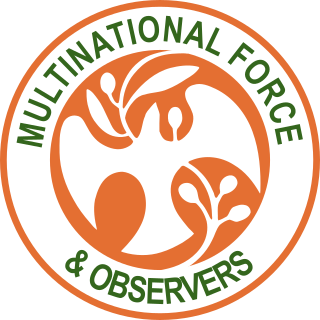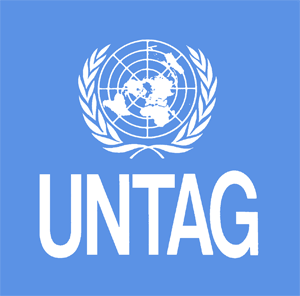
Peacekeeping comprises activities, especially military ones, intended to create conditions that favor lasting peace. Research generally finds that peacekeeping reduces civilian and battlefield deaths, as well as reduces the risk of renewed warfare.

The United Nations Organization Stabilization Mission in the Democratic Republic of the Congo or MONUSCO, an acronym based on its French name Mission de l'Organisation des Nations Unies pour la stabilisation en République démocratique du Congo, is a United Nations peacekeeping force in the Democratic Republic of the Congo (DRC) which was established by the United Nations Security Council in resolutions 1279 (1999) and 1291 (2000) to monitor the peace process of the Second Congo War, though much of its focus subsequently turned to the Ituri conflict, the Kivu conflict and the Dongo conflict. The mission was known as the United Nations Mission in the Democratic Republic of Congo or MONUC, an acronym of its French name Mission de l'Organisation des Nations Unies en République démocratique du Congo, until 2010.

The Multinational Force and Observers (MFO) is an international peacekeeping force overseeing the terms of the peace treaty between Egypt and Israel. The MFO generally operates in and around the Sinai peninsula, ensuring free navigation through the Straits of Tiran and the Gulf of Aqaba, and compliance with the other terms of the Egypt–Israel peace treaty.

The United Nations Mission in Liberia (UNMIL) was a United Nations peacekeeping operation established in September 2003 to monitor a ceasefire agreement in Liberia following the resignation of President Charles Taylor and the conclusion of the Second Liberian Civil War (1999–2003). At its peak it consisted of up to 15,000 UN military personnel and 1,115 police officers, along with civilian political advisors and aid workers.

The International Force East Timor (INTERFET) was a multinational non-United Nations peacemaking task force, organised and led by Australia in accordance with United Nations resolutions to address the humanitarian and security crisis that took place in East Timor from 1999–2000 until the arrival of UN peacekeepers. INTERFET was commanded by an Australian military officer, Major General Peter Cosgrove.

The African Standby Force (ASF) is an international, continental African, and multidisciplinary peacekeeping force with military, police and civilian contingents that acts under the direction of the African Union. The ASF is to be deployed in times of crisis in Africa. Addis Ababa, Ethiopia, serves as the Force's Headquarters. Douala, Cameroon, was selected in 2011 as the site of the AU's Continental Logistics Base (LOGBASE).

The Department of Peace Operations (DPO) is a department of the United Nations charged with the planning, preparation, management and direction of UN peacekeeping operations. Previously known as the Department of Peacekeeping Operations (DPKO), it was created in March 1992, as part of a restructuring of the UN's peace and security apparatus. The DPO retains the core functions and responsibilities of its predecessor, with a greater emphasis on cohesion, integrating different resources and knowledge, and promoting human rights.

Pakistan has served in 46 United Nations peacekeeping missions in 29 countries around the world. As of 2023, United Nations (UN) statistics show that 168 Pakistani UN peacekeepers have been killed since 1948. The biggest Pakistani loss occurred on 5 June 1993 in Mogadishu. Pakistan joined the United Nations on 30 September 1947, despite opposition from Afghanistan because of the Durand Line issue. The Pakistan Armed Forces are the sixth largest contributor of troops towards UN peacekeeping efforts, behind Ethiopia and Rwanda.

MINUGUA was a United Nations humanitarian mission in Guatemala that involved, at the most critical point in the peace process, a three-month peacekeeping mission.

The United Nations Transition Assistance Group (UNTAG) was a United Nations (UN) peacekeeping force deployed from April 1989 to March 1990 in Namibia, known at the time as South West Africa, to monitor the peace process and elections there. Namibia had been occupied by South Africa since 1915, first under a League of Nations mandate and later illegally. Since 1966, South African forces had been combating an insurgency by the People's Liberation Army of Namibia (PLAN), the military wing of the Namibian-nationalist South West African People's Organization (SWAPO). The UN Security Council passed Resolution 435 in 1978, which set out a plan for elections administered by South Africa but under UN supervision and control after a ceasefire. However, only in 1988 were the two parties able to agree to a ceasefire. As UNTAG began to deploy peacekeepers, military observers, police, and political workers, hostilities were briefly renewed on the day the transition process was supposed to begin. After a new round of negotiations, a second date was set and the elections process began in earnest. Elections for the constitutional assembly took place in November 1989. They were peaceful and declared free and fair; SWAPO won a majority of the seats. The new constitution was adopted four months later and it was followed by Namibia's official independence and the successful conclusion of UNTAG.

The Department of Safety and Security (UNDSS) is a department of the United Nations providing safety and security services for UN agencies and departments as part of the UN Safety Management System. UNDSS reports directly to the Secretary-General. The UNDSS manages a network of security advisers, analysts, officers and coordinators in more than 125 countries in support of around 180,000 United Nations personnel, 400,000 dependents, and 4,500 United Nations premises worldwide. The department is led by Under-Secretary-General Gilles Michaud from Canada.

The Bangladesh Armed Forces and the Bangladesh Police have been actively involved in a number of United Nations Peace Support Operations (UNPSO) since 1988. Currently Bangladesh is the largest contributor in the UN peacekeeping missions.
Peacekeeping by the United Nations is a role of the UN's Department of Peace Operations as an "instrument developed by the organization as a way to help countries torn by conflict to create the conditions for lasting peace". It is distinguished from peacebuilding, peacemaking, and peace enforcement although the United Nations does acknowledge that all activities are "mutually reinforcing" and that overlap between them is frequent in practice.
The United Nations Transitional Authority in Cambodia (UNTAC) was a peacekeeping mission established in the early 1990s following the civil war which broke out in Cambodia after the collapse of the Khmer Rouge regime in 1979. The Australian government had closely followed events in Cambodia given the possible implications for regional security, while out of a desire to be seen as a good international citizen it had also invested heavily diplomatically in order to push the parties towards a peace agreement. In August 1989 the UN attempted to broker a peace agreement between the warring factions, and included amongst the reconnaissance party were two Australian officers tasked with laying the groundwork for a monitoring force should it be deployed. However, after the collapse of the peace effort the proposed UN force was cancelled and the reconnaissance team withdrawn.
Letters of assist refers to a contractual document issued by the United Nations (UN) to a government authorizing it to provide goods or services to a peacekeeping or other UN operation.

The United Nations Police (UNPOL) is an integral part of the United Nations peace operations. Currently, about 11530 UN Police officers from over 90 countries are deployed in 11 UN peacekeeping operations and 6 Special Political Missions. The "mission of the UN Police is to enhance international peace and security by supporting Member States in conflict, post-conflict and other crisis situations to realise effective, efficient, representative, responsive and accountable police services that serve and protect the population".

The Australian Services Contingent was the Australian Army contribution to the United Nations Transition Assistance Group (UNTAG) peacekeeping mission to Namibia in 1989 and 1990. Australia sent two contingents of over 300 engineers each to assist the Special Representative of the Secretary General, Martti Ahtisaari, in overseeing free and fair elections in Namibia for a Constituent Assembly in what was the largest deployment of Australian troops since the Vietnam War.

So far India has taken part in 49 Peacekeeping missions with a total contribution exceeding 200,000 troops and a significant number of police personnel having been deployed and more than 160 Indian peacekeepers have died serving under the UN flag as of September 2022. In 2014 India is the third largest troop contributor country [TCC] with 7,860 personnel deployed with ten UN Peacekeeping Missions of which 995 are police personnel, including the first Female Formed Police Unit under the UN. Recently Indian Peacekeepers were lauded by the UN for their efforts in preventing a carnage in the South Sudan conflict which resulted in the death of two of its soldiers.
Malaysia became the 82nd member of the United Nations on 17 September 1957. Malaysia has held a rotational non-permanent seat on the United Nations Security Council for four terms, and has participated in over 30 United Nations peacekeeping missions since October 1960.










